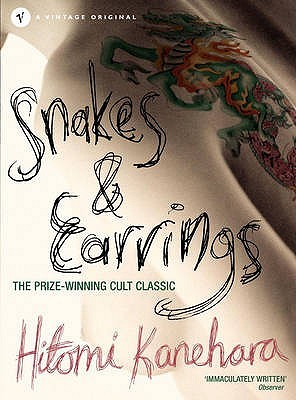It’s a little early to be calling, as the cover boldly declares, Snakes & Earrings (2004) by Hitomi Kanehara a “cult classic”, but within its pages there’s enough to warrant it, one day, being recognised as such. It already has one major Japanese award to its name, the Akutagawa prize, making Kanehara, along with Risa Wataya, the youngest winners since it was launched in 1935. On the judging panel in 2003, it’s little surprise to find, was Ryu Murakami, a cult name himself and, going on the basis of his novel Piercing, Kanehara’s line in outsiders and sado-fantasy is much akin to his own.
Teling the story in Snakes & Earrings is Lui, a nineteen year old Barbie-girl (or kogal) who is bored with a life that is “little more than a pastiche of drunken moments”. One day, in a bar, unsurprisingly, she meets a punk called Ama and is immediately drawn to his forked tongue, a feature achieved through the art of body modification:
Apparently, you begin by getting your tongue pierced. You then gradually enlarge the hole by inserting bigger and bigger tongue rings. Then, when the hole has been stretched to a certain size, you tie dental floss or fishing line in tight loops running from the hole down the middle of the tongue. Finally, you cut the remaining part of the tongue that’s still connected using either a scalpel or a razor-blade. In fact some people don’t even bother going through the whole pierce-and-tie process at all – they just slice their tongue in two with a scalpel.
To Lui it’s an enticing idea and Ama takes her to Desire, “a kind of punk/alternative store in a side-street basement”, to have her tongue pierced by Shiba-san. But tongue piercing is not enough and Lui urges Shiba-san to design her a tattoo. She settles on one depicting two mythical beasts, a dragon and a kirin. The choice of these creatures runs parallel to the love triangle she gets involved in, for Ama has a tattoo of a dragon, Shiba-san the other.
As to why Lui would suddenly make these decisions about her body, there’s little explanation given. With disaffected youth, however, the most minimal of reasons is reason enough:
All I wanted was to be part of an underground world where the sun doesn’t shine, there are no love songs, and the sound of children’s laughter is never, ever heard.
Both of the men in Lui’s life are extremists of a sort. Ama has a short fuse and in one early scene beats up a man, leaving him for dead, for touching Lui. Shiba-san is a sadist, pure and simple, with a preference for choking people. Being with these guys at different times is all the rush that Lui needs: be it the education of her new subculture, of sex, of pain. Although she’s still very much alive, her self-concern is so far gone that she may as well be dead. Indeed, she acts as if she is, with respect to her body:
They do say dead men tell no tales after all. In which case, surely there’s nothing more meaningless than not being able to give an opinion on anything. It makes me wonder why people fork out fortunes to pay for tombstones. I mean, for me, I’ve got absolutely no interest in my body if my mind no longer lives in it. I couldn’t care less if it was eaten by dogs.
The triangle between Lui and her men develops, with both expressing their love for her. And when events hit crisis point, she is able to move on, finding comfort in her new tattoo:
Possession can be such a hassle, and yet we are still driven by the desire to possess people and things. Maybe it appeals to the masochist and sadist in every one of us. As for me, I knew that the dragon and Kirin on my back would always be with me. They’d never betray me and I would never betray them.
In reading Snakes & Earrings it feels like Kanehara is out to shock rather than say anything. People come and go in her book, saying little of note. It’s told in a graphic style, with explicit scenes of sex, violence, and humiliation. The sad thing is, however, that what could have been an interesting eye-opener into a subculture, providing an opportunity to express why people turn to body modification, is no more than skin deep.

I have always been fascinated with Japanese pop culture. Any suggestions?
Ew. I couldn’t get past that first extract. I must be squeamisher (is that even a word?) than I thought.
Ooh. I’m preparing to be shocked. It sounds delicious!
Chica, I have absolutely no idea. What are you looking for? Literature? Music? Movies?
She also has a new novel out, Auto Fiction. I was going to read that, but thought I’d rather read the prize winner first.
Well, now you have. So read it! Please. I am extraordinarily excited about this, I’m gonna go Amazoning right this instant!
Thanks for stopping by. Great review! I agree with you about it seeming out to shock as it certainly was graphic. That quote about how to make a forked tongue has me cringing all over again! It’ll be interesting to see how her writing transforms as she gets older.
I agree with your sentiments at the end – the book was less concerned with exploring the body modification subculture than it was with leaving you wanting to crawl out of your skin. Maybe that was the point?
Thanks for stopping by my blog! Long may it continue.